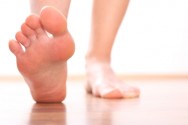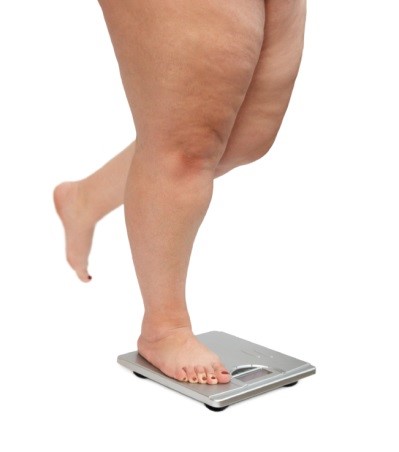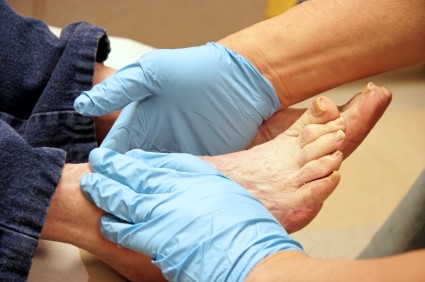Connect With Us
Items filtered by date: June 2015
Study Finds Heels Weaken Feet and Ankle over a Long Period of Time
 In a new study published this month in The International Journal of Clinical Practice, researchers atHanseo University in South Korea tested the strength and balance of the feet of ten young women of each class from the university who were studying to become airline attendants. As flight attendants in training, they were required to wear high heels to class in preparation for time spent wearing heels on the job on a Korean airline. While compared to freshman, upperclassmen initially showed greater strength in certain ankle muscles while also displaying weakening muscles over a longer period of time. Upperclassmen had worse balance than the freshman in general.
In a new study published this month in The International Journal of Clinical Practice, researchers atHanseo University in South Korea tested the strength and balance of the feet of ten young women of each class from the university who were studying to become airline attendants. As flight attendants in training, they were required to wear high heels to class in preparation for time spent wearing heels on the job on a Korean airline. While compared to freshman, upperclassmen initially showed greater strength in certain ankle muscles while also displaying weakening muscles over a longer period of time. Upperclassmen had worse balance than the freshman in general.
High heels can cause a ton of foot problems and some women just cannot wear them. If you have any concerns about your feet contact one of our podiatrists of The Podiatry Center. Our doctors will treat your foot and ankle needs.
Effects of High Heels on the Feet
High heels are popular shoes among women because they are associated with femininity. Despite their appeal, they can cause many health problems if worn too frequently.
What parts my body will be affected by high heels?
- Ankle Joints
- Achilles Tendon – may shorten and stiffen with prolonged wear
- Balls of the Feet
- Knees – heels cause the knees to bend constantly, creating stress on them
- Back – they decrease the spine’s ability to absorb shock, which may lead to back pain. Also, the vertebrae of the lower back may compress.
What kinds of foot problems can develop from wearing high heels?
- Corns
- Calluses
- Hammertoe
- Bunions
- Morton’s Neuroma
- Plantar Fasciitis
How can I still wear high heels and maintain foot health?
If you want to wear high heeled shoes, make sure that you are not wearing them every day, as this will help prevent long term physical problems. Try wearing thicker heels as opposed to stilettos to distribute weight more evenly across the feet. Always make sure you are wearing the proper shoes for the right occasion, such as sneakers for exercising. If you walk to work, try carrying your heels with you and changing into them once you arrive at work. Adding inserts to your heels can help cushion your feet and absorb shock; you can buy either full inserts or metatarsal pads.
If you have any questions please feel free to contact our office located in Millburn, NJ. We offer the newest diagnostic tools and technology to treat your foot and ankle needs.
Regular Foot Screenings Important in Catching Foot Issues Early
 According to Christina Drummond of the Star Press getting regular foot screenings is important to catch foot problems early, especially in those dealing with diabetes or obesity. Those suffering from obesity and diabetes are at an increased risk of circulation problems that can lead to amputation or other health problems. Foot screenings involve an examination of the color and condition of the skin and by discussing any problems the patient may be having. Podiatrists can also use ultrasound technology to examine the blood flow in the foot and through the main arteries to identify any issues.
According to Christina Drummond of the Star Press getting regular foot screenings is important to catch foot problems early, especially in those dealing with diabetes or obesity. Those suffering from obesity and diabetes are at an increased risk of circulation problems that can lead to amputation or other health problems. Foot screenings involve an examination of the color and condition of the skin and by discussing any problems the patient may be having. Podiatrists can also use ultrasound technology to examine the blood flow in the foot and through the main arteries to identify any issues.
Any additional problems in the feet of those with obesity can be detrimental to foot health. If you have any concerns about your feet contact one of our podiatrists of The Podiatry Center, PC. Our doctors will treat your foot and ankle needs.
Obesity and your Feet
Since your feet are what support your entire weight when standing, any additional weight can result in pain and swelling. Being overweight is one of the main contributors to foot complications.
Problems & Complications
Extra Weight – Even putting on just a few extra pounds could create serious complications for your feet. As your weight increases, your balance and body will shift, creating new stresses on your feet. This uneven weight distribution can cause pain, even while doing the simplest tasks, such as walking.
Diabetes – People who are overweight are at serious risk of developing type-2 diabetes, which has a drastic impact on the health of your feet. As you get older, your diabetes might worsen, which could lead to loss of feeling in your feet, sores, and bruises. You could also become more prone to various infections.
Solutions
Footwear – Specially made footwear that supports your joints, arches, and ankles, and allows room for good circulation is a great option to mitigate pressure and pain. A podiatrist will help you decide what works best for your specific needs.
Exercise – Exercise will help alleviate the pain and give your feet the strength it needs to support your body. Exercise also increases blood flow to your feet, allowing them to remain healthy and strong.
Most importantly, seek the help of a podiatrist for foot care if something is wrong or doesn’t seem to be working. A podiatrist will help you with any questions or information needed.
If you have any questions please feel free to contact our office located in Millburn, NJ. We offer the newest diagnostic tools and technology to treat your foot and ankle needs.
Paula Radcliffe Prepares for Her Final Run after Years of Dealing with Foot Pain
 Paula Radcliffe, one of the best known female distance runners in history, will run for what may be her last time in the London marathon after suffering with many foot problems including arthritic foot. Although her foot has healed and she has made small improvements in coming back to the track after many surgeries, Radcliffe states, “I just know my body can’t take marathon training anymore.”
Paula Radcliffe, one of the best known female distance runners in history, will run for what may be her last time in the London marathon after suffering with many foot problems including arthritic foot. Although her foot has healed and she has made small improvements in coming back to the track after many surgeries, Radcliffe states, “I just know my body can’t take marathon training anymore.”
Arthritis is a painful condition and arthritic foot care is necessary to avoid further complications. If you have any concerns contact one of our podiatrists of The Podiatry Center, PC. Our doctors will treat your foot and ankle needs.
What is Arthritis?
Arthritis is a joint disorder that involves inflammation of different joints in your body, such as in your feet. Arthritis is often caused by a degenerative joint disease and causes mild to severe pain in all affected areas. On top of this, swelling and stiffness in the affected joints can also be a common symptom of arthritis.
In many cases, wearing ill-fitting shoes can worsen the effects and pain of arthritis. Wearing shoes that have a lower heel and extra room can help your feet feel more comfortable. In cases of rheumatoid arthritis, the arch in your foot may become problematic. Buying shoes with proper arch support that contour to your feet can help immensely.
Alleviating Arthritic Pain
- Exercises that stretch the foot can prevent further pain and injury and increase mobility
- Most of the pain can be alleviated with anti-inflammatory drugs, heat, and topical medications
- Massages can help to temporarily alleviate pain.
It is best to see your doctor for the treatment that is right for your needs and symptoms. Conditions vary, and a podiatrist can help you determine the right method of care for your feet.
If you have any concerns contact our office located in Millburn, NJ. We offer the newest diagnostic tools and technology to treat your foot and ankle needs.
German Researchers Create Sock that Can Prevent Amputations on Diabetic Feet
 Researchers fromWurzburg and Fraunhofer Institute for Integrated Circuits in Erlangen, Germany have recently created a pressure sensing sock to aid diabetics suffering from diabetic neuropathy. Often times those with neuropathy are unable to sense pressure on their feet and can obtain wounds that could lead to issues such as gangrene and amputations. The device has over 40 sensors made of a silicone film where pressure points on the feet are combined and mapped to help prevent further issues. Although the sock is a great innovation for the diabetic community, researchers are still working to make the device less bulky and more accessible.
Researchers fromWurzburg and Fraunhofer Institute for Integrated Circuits in Erlangen, Germany have recently created a pressure sensing sock to aid diabetics suffering from diabetic neuropathy. Often times those with neuropathy are unable to sense pressure on their feet and can obtain wounds that could lead to issues such as gangrene and amputations. The device has over 40 sensors made of a silicone film where pressure points on the feet are combined and mapped to help prevent further issues. Although the sock is a great innovation for the diabetic community, researchers are still working to make the device less bulky and more accessible.
Diabetic patients are often at a high risk for neuropathy, amputations, and other issues. If you have any concerns about your diabetic feet, Contact one of our podiatrists of The Podiatry Center. Our doctors will treat your foot and ankle needs.
Diabetic Foot Care
Diabetes affects millions of people every year. Diabetes can damage blood vessels in many parts of the body, including the feet. Because of this, taking care of your feet is essential if you have diabetes, and having a podiatrist help monitor your foot health is highly recommended.
The Importance of Caring for Your Feet
- Routinely inspect your feet for bruises or sores.
- Wear socks that fit your feet comfortably.
- Wear comfortable shoes that provide adequate support.
Patients with diabetes should have their doctor monitor their blood levels because blood sugar levels play such a huge role in diabetic care. Monitoring these levels on a regular basis is highly advised.
It is always best to inform your healthcare professional of any concerns you may have regarding your feet, especially for diabetic patients. Early treatment and routine foot examinations are keys to maintaining proper health, especially because severe complications can arise if proper treatment is not applied.
If you have any questions please feel free to contact our office located in Millburn, NJ. We offer the newest diagnostic tools and technology to treat your foot and ankle needs.
Blog Archives
- June 2025
- May 2025
- April 2025
- March 2025
- February 2025
- January 2025
- December 2024
- November 2024
- October 2024
- September 2024
- August 2024
- July 2024
- June 2024
- May 2024
- April 2024
- March 2024
- February 2024
- January 2024
- December 2023
- November 2023
- October 2023
- September 2023
- August 2023
- July 2023
- June 2023
- May 2023
- April 2023
- March 2023
- February 2023
- January 2023
- December 2022
- November 2022
- October 2022
- September 2022
- August 2022
- July 2022
- June 2022
- May 2022
- April 2022
- March 2022
- February 2022
- January 2022
- December 2021
- November 2021
- October 2021
- September 2021
- August 2021
- July 2021
- June 2021
- May 2021
- April 2021
- March 2021
- February 2021
- January 2021
- December 2020
- November 2020
- October 2020
- September 2020
- August 2020
- July 2020
- June 2020
- May 2020
- April 2020
- March 2020
- February 2020
- January 2020
- December 2019
- November 2019
- October 2019
- September 2019
- August 2019
- July 2019
- June 2019
- May 2019
- April 2019
- March 2019
- February 2019
- January 2019
- December 2018
- November 2018
- October 2018
- September 2018
- August 2018
- July 2018
- June 2018
- May 2018
- April 2018
- March 2018
- February 2018
- January 2018
- December 2017
- November 2017
- October 2017
- September 2017
- August 2017
- July 2017
- June 2017
- May 2017
- April 2017
- March 2017
- February 2017
- January 2017
- December 2016
- November 2016
- October 2016
- September 2016
- August 2016
- July 2016
- June 2016
- May 2016
- April 2016
- March 2016
- February 2016
- January 2016
- December 2015
- November 2015
- October 2015
- September 2015
- August 2015
- July 2015
- June 2015
- May 2015
- January 2014
- December 2013
- November 2013
- October 2013
- September 2013
- August 2013
- July 2013
- June 2013
- May 2013
- April 2013
- March 2013
- February 2013
- January 2013
- December 2012
- November 2012
- October 2012
- September 2012
- August 2012
- July 2012
- June 2012
